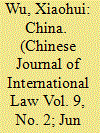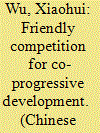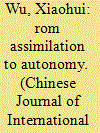|
|
|
Sort Order |
|
|
|
Items / Page
|
|
|
|
|
|
|
| Srl | Item |
| 1 |
ID:
163443


|
|
|
|
|
| Summary/Abstract |
The ICJ’s judgment on preliminary objections in Somalia v. Kenya touched new ground by ruling on such key provisions of UNCLOS as Articles 282 and 287. Its implications may go well beyond the present case. The Court ruled that the acceptance of its jurisdiction arising under Article 282 prevails over the selection of a preferred tribunal under Article 287 by election or by default. Some thought needs to be given to the manner in which the Court interpreted Articles 282 and 287. Instead of using the travaux préparatoires as a supplementary means to confirm the meaning resulting from the application of the general rule in Article 31 of the VCLT, the Court seemed to base the core of its interpretation on the travaux préparatoires. The Court’s interpretation of the relationship between Articles 282 and 287 in effect accords pride of place to itself. On a practical front, some States Parties of UNCLOS which have made optional clause declarations with reservations of various types may have to ponder what this Judgment means for them in the case of maritime delimitation disputes. Those States Parties which have not chosen the Court as its preferred forum or given it any prominence under Art. 287(1) will see their express choices of means of dispute settlement to be under a cloud, in light of the Court’s interpretation of Art. 282 in the present case.
|
|
|
|
|
|
|
|
|
|
|
|
|
|
|
|
| 2 |
ID:
097082


|
|
|
|
|
| Publication |
2010.
|
| Summary/Abstract |
The report of the Appellate Body of the WTO Dispute Settlement Body in China - Publications touches new ground by ruling on a few key legal issues. Its significance and ramifications go well beyond the present case and may influence subsequent WTO jurisprudence relating to the distinction between goods and services, trading rights commitments and availability of General Agreement on Tariffs and Trade (GATT) Article XX defense, etc. Nevertheless, the Appellate Body report has its shortcomings, especially in relation to what the author views to be a flawed interpretation of GATT Article XX(a). This paper argues for the Appellate Body abandoning the present interpretive approach in favour of a truly holistic and integrated analytical framework in its future jurisprudence.
|
|
|
|
|
|
|
|
|
|
|
|
|
|
|
|
| 3 |
ID:
170436


|
|
|
|
|
| Summary/Abstract |
This Survey covers materials reflecting Chinese practice in 2017 relating to: treaties, agreements and other documents signed or ratified by the People’s Republic of China; national legislation; statements made by Chinese representatives at the meetings of the UN and other international organizations, international conferences, and those made by the Foreign Ministry spokespersons, with respect to various branches of international law; and judicial decisions, in particular on the applicability and application of international conventions, by Chinese courts
|
|
|
|
|
|
|
|
|
|
|
|
|
|
|
|
| 4 |
ID:
182587


|
|
|
|
|
| Summary/Abstract |
This Survey covers materials reflecting Chinese practice in 2019 relating to: treaties, agreements and other documents signed or ratified by the People’s Republic of China; national legislation; statements made by Chinese representatives at the meetings of the UN and other international organizations, international conferences, and those made by the Foreign Ministry spokespersons, with respect to various branches of international law; and judicial decisions, in particular on the applicability and application of international conventions, by Chinese courts.
|
|
|
|
|
|
|
|
|
|
|
|
|
|
|
|
| 5 |
ID:
153438


|
|
|
|
|
| Summary/Abstract |
The AIIB is the first major multilateral development bank in a generation and the first multinational institution initiated by China to support regional economic growth and inject new impetus to global governance reform. From the beginning, the AIIB must seek ways to set itself apart from the establishment as represented by the BWIs. This article proposes that the new AIIB break with conventional wisdom and the business as usual of the BWIs and adopt the concept of co-progressiveness for international development. Co-progressive development entails a normative principle that puts self-initiation and external inducement as a means of promoting self-initiated action at the center of international development agendas and programs. As a more proactive and effective system of international development is urgently needed, this article argues that the AIIB and the BWIs should engage in a friendly competition in which players compete for a common goal. Within the AIIB, development strategies, models, policies, as well as expertise and knowledge originating from such developing countries as emerging economies should be given equal or even prioritized consideration, as emerging economies have faced similar challenges and succeeded with innovative solutions. In doing so, the AIIB can lend legitimacy to its international foray, while the global development agenda will be advanced more effectively.
|
|
|
|
|
|
|
|
|
|
|
|
|
|
|
|
| 6 |
ID:
107076


|
|
|
|
|
| Publication |
2011.
|
| Summary/Abstract |
China joined the WTO in 2001 under exceptionally unfavourable, non-reciprocal and asymmetric terms of membership. China's less-than-equal status raises difficult legal questions with respect to the rule of law in the WTO, as they call into question the normativity of the fundamental principles that underlie the WTO system. It is argued that, in Dispute Settlement Body cases involving China's WTO-plus obligations, restrictive interpretation should generally be used to determine the meaning of an ambiguous provision, as a value-oriented interpretative approach in favour of the equilibrium of rights and obligations of China and in deference to the uniformity and integrity of the WTO legal system. For bilateral trade relations to be mutually advantageous and more balanced, major WTO members should offer equal status to China in the world trading system, in exchange for China's full compliance with its WTO commitments and greater contribution to the world trading system. This entails the development of reciprocal and cooperative trade policies on both sides.
|
|
|
|
|
|
|
|
|
|
|
|
|
|
|
|
| 7 |
ID:
134206


|
|
|
|
|
| Publication |
2014.
|
| Summary/Abstract |
This article examines regional autonomy in China's ethnic minority areas and its implications for minority rights in China. It argues that China's regional autonomy regime is in need of improvement in quest for national unity, social harmony and equality among ethnic groups in China. In light of past State-minority relations, as well as changing conditions in China, and by reference to international experience, the article offers suggestions for China to improve and implement minority rights legislation and policies. It argues that, under the existing political system in view of the existing basic framework on minorities, the Chinese State should adopt a new approach which encompasses elements of rule of law, deliberative democracy and international human rights standards. The new approach should guarantee respect for minority identities and seek means of establishing their respective autonomies and realizing their special rights. It should focus as much on the process as on the decisions, on the voices as on the results and on the individuals as on the groups. In this way, China's national regional autonomy would be oriented towards a complete policy of commitment to pluralistic values within the Chinese polity and would be more likely to satisfy the minority aspirations and the State's need for national stability and unity.
|
|
|
|
|
|
|
|
|
|
|
|
|
|
|
|
|
|
|
|
|